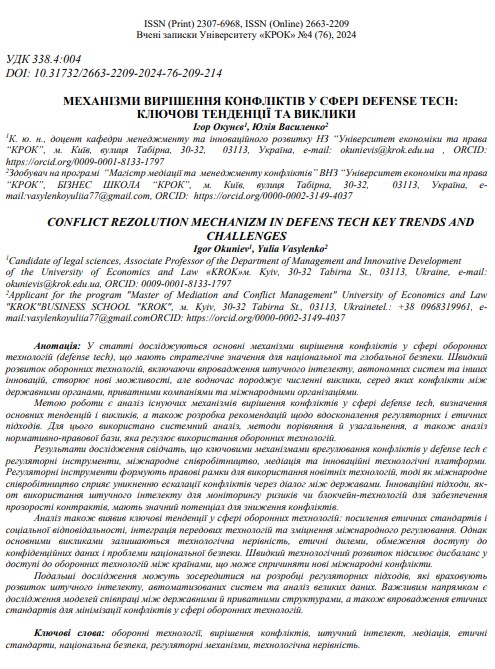CONFLICT REZOLUTION MECHANIZM IN DEFENS TECH KEY TRENDS AND CHALLENGES
DOI:
https://doi.org/10.31732/2663-2209-2024-76-209-214Keywords:
defense technology, conflict resolution, artificial intelligence, mediation, ethical standards, national security, regulatory mechanisms, technological inequalityAbstract
The article examines the key mechanisms for conflict resolution in the defense technology sector (defense tech), which is of strategic importance for national and global security. The rapid development of defense technologies, including artificial intelligence, autonomous systems, and other innovations, creates new opportunities but also significant challenges, such as conflicts between government agencies, private companies, and international organizations. The study aims to analyze existing mechanisms for resolving conflicts in defense tech, identify major trends and challenges, and propose recommendations for improving regulatory and ethical approaches. Systematic analysis, comparative methods, and legal framework reviews were employed to achieve this goal. The findings indicate that the primary mechanisms for conflict resolution in defense tech include regulatory tools, international cooperation, mediation, and innovative technological platforms. Regulatory tools provide a legal framework for the use of cutting-edge technologies, while international cooperation facilitates dialogue between states to prevent conflict escalation. Innovative approaches, such as the use of artificial intelligence for risk monitoring and blockchain technologies for contract transparency, hold significant potential for reducing conflicts. The analysis also highlights key trends in the defense tech sector: strengthening ethical standards and social responsibility, integrating advanced technologies, and enhancing international regulations. However, significant challenges remain, including technological inequality, ethical dilemmas, restricted access to confidential data, and national security concerns. Rapid technological advancements exacerbate disparities in access to defense technologies between countries, potentially leading to new international conflicts. Future research could focus on developing regulatory frameworks that address the dynamic growth of artificial intelligence, automated systems, and big data analytics. A critical area of study is the exploration of collaboration models between public and private entities, as well as the implementation of ethical standards to minimize conflicts in the defense technology sector. Keywords: defense technology, conflict resolution, artificial intelligence, mediation, ethical standards, national security, regulatory mechanisms, technological inequality.Downloads
References
Florkin, J. (2021). AI in modern warfare: Enhancing precision, efficiency, and strategy. Retrieved from https://julienflorkin.com/uk/%D0%B2%D1%96%D0%B9%D1%81%D1%8C%D0%BA%D0%BE%D0%B2%D0%B8%D0%B9/Modern-Warfare/ai-%D1%83-%D1%81%D1%83%D1%87%D0%B0%D1%81%D0%BD%D1%96%D0%B9-%D0%B2%D1%96%D0%B9%D0%BD%D1%96/
Helsinki, U. (2023). Artificial intelligence and human rights: Guidelines and limitations. Retrieved from https://www.helsinki.org.ua/articles/shtuchnyy-intelekt-ta-prava-liudyny-oriientyry-ta-obmezhennia-u-konteksti-natsionalnoi-bezpeky-ta-oborony/
NATO Review. (2021). Quantum technologies in defense and security. Retrieved from https://www.nato.int/docu/review/uk/articles/2021/06/03/kvantov-tehnolog-v-oboron-bezpets/index.html
Ukrainian Helsinki Human Rights Union. (2023). Ethical challenges in AI for defense applications. Retrieved from https://www.helsinki.org.ua/articles/
Economic Management. (2023). Military conflicts as a catalyst for innovation. Retrieved from https://em.duit.in.ua/index.php/home/article/view/65
CES. (2022). Ethical challenges in AI and modern defense applications. Retrieved from https://www.ces.tech/
Pylypenko, N., Hubar, O., & Chyrva, H. (2023). Ethical aspects of using artificial intelligence in education. Futurity Publishing. Retrieved from https://futurity-publishing.com/wp-content/uploads/2023/11/Pylypenko-N.-Hubar-O.-Chyrva-H.-2023.pdf
Julien, F. (2022). Modern warfare and AI-driven strategies. Retrieved from https://julienflorkin.com/
National Defense University of Ukraine. (2023). Modern information technologies in the field of security and defense. Retrieved from https://nuou.org.ua/nauka/npub/sit-sbo/
Donetsk National University. (2023). Impact of AI on the military sector. Journal of Law, Administration, and Social Development. Retrieved from https://jpasmd.donnu.edu.ua/article/view/14821
Ukrinform. (2023). Technological re-equipment of Ukraine as a shield against aggression. Retrieved from https://www.ukrinform.ua/rubric-polytics/3258718-tehnologicne-pereozbroenna-ukraini-ak-sit-vid-rosijskoi-agresii.html
Zenodo. (2023). AI and its impact on ethical aspects of research. Retrieved from https://zenodo.org/records/8174388

Downloads
Published
How to Cite
Issue
Section
License

This work is licensed under a Creative Commons Attribution-NonCommercial 4.0 International License.

